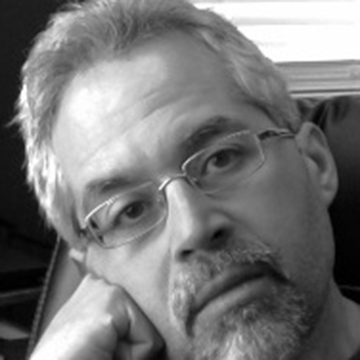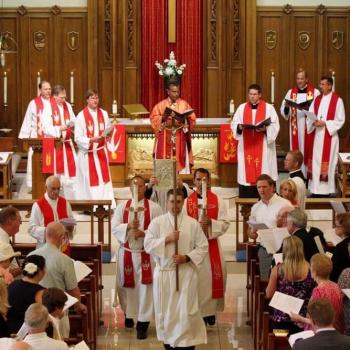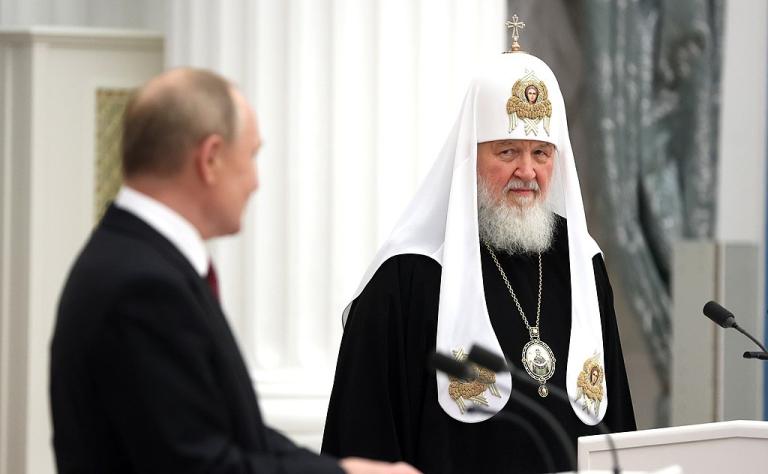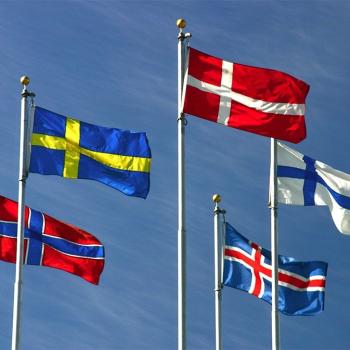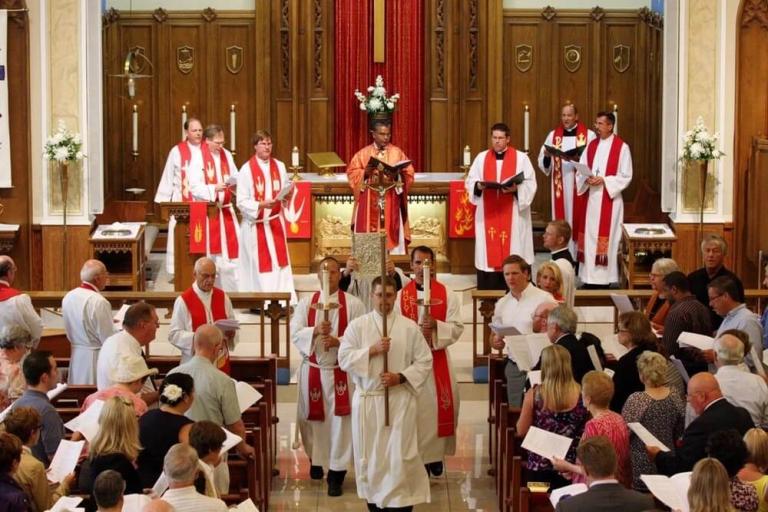
When my wife and I first attended a Lutheran service, we were impressed with how formal it was, a far cry from what we were used to in the mainline Protestant denominations we grew up in and in the evangelical congregations we attended in college. So we came back next week, only to find both the congregation and the pastor chanting. We thought we had been transported back to the Middle Ages.
It turns out, that first service we attended was the one informal service that was held on months with five Sundays. We came to learn that when Lutherans try to be informal–or, more recently, contemporary–they are still more formal and less contemporary than just about anyone else. But the definitive Lutheran worship, which we learned to treasure, is to be found in what they call the “Divine Service,” which is called that because in it, Lutherans believe, God serves us.
Patheos has asked its writers to respond to some of the most frequent questions about the various religious traditions that they receive. What most puzzles Patheos readers about Lutheranism is its worship. They wonder what they need to know in order to understand what is going on. Specifically, as the Patheos editors summarize the inquiries, “What should I keep in mind when visiting a Lutheran church?” So it falls to me to try to explain.
What follows is an account of the traditional Divine Service, which can be dressed up or down, made more elaborate or more simple. Even contemporary Lutheran services will tend to have the same structure and most of the same elements–from the confession and absolution to the Law & Gospel sermons–so that what I describe here, except for what I say about music, will mostly still apply.
(1) The Liturgy Consists Mostly of Words from Scripture
The first reaction of many visitors is, “This is Catholic!” Or, “This is too Catholic!” Yes, the liturgy goes way back through church history and is similar to that of Roman Catholics, the Orthodox, and, among Protestants, Anglicans, whose Book of Common Prayer was greatly influenced by Lutheranism.
But the Lutheran liturgy also shows forth the principles of the Reformation. Luther wanted to reform the church, not start a new one. Later Protestants would want to start, more or less, from scratch, but the work of “reforming” means changing what is problematic, but leaving what is good. For Luther, everything that pointed away from Christ and the Gospel should be eliminated, but what does point to Christ and the Gospel should be retained.
So the Lutheran liturgy leaves out elements in the Catholic mass such as praying for the dead and invoking the saints. But it retains the overall structure and the ancient liturgical set-pieces, such as the Kyrie (“Lord have mercy. . .”) and the Agnus Dei (“Lamb of God who takes away the sins of the world”). In fact, those set pieces and nearly all of the responses of the congregation are taken straight from the Bible. When someone objects to our liturgy, I ask, “Which words of God do you think we shouldn’t say?”
The sanctuary will also demonstrate the Reformation principle of retaining elements that point to Christ. There will typically be quite a bit of art in the sanctuary. Lots of crosses. That will include pictures of Jesus and other representational art. This is not idolatry, since that means worshiping false gods and Jesus is the true God, who came as a visible, tangible human being discernible by the senses (1 John 1:1). Lots of crucifixes, depicting Jesus on the cross. Some Christians say that one should only use empty crosses because Jesus isn’t on the cross any more–He rose! Well, Lutherans certainly believe in His Resurrection (and also have empty crosses), but we need to keep a constant focus on “Christ crucified” (1 Corinthians 2:1 and 2 Corinthians 1:2), upon which which our salvation is based and which Lutherans apply in a host of ways in their “theology of the Cross.”
(2) Chanting Lets Us Sing Prose, Such as Texts from Scripture
The Divine Service is mostly chanted by both the pastor and the congregation. This may be the aspect that seems the most “Catholic” or “Medieval” or just unusual to visitors. But chanting, with its flexible meter and flowing melodic line, is simply the way that a person can sing prose.
Most of our songs today–whether hymns or raps–are metrical, with fixed patterns of rhythm and rhyme. That is to say, they put music to poems. But it is also possible to sing any sequence of words. That requires music that flows along with the pattern of speech. This is what chanting is.
Some of my friends who are Reformed (a term Lutherans never use for themselves), belong to Psalms-only congregations. Using their principle that Christians may only do what the Bible specifies (while Lutherans believe they are free to do whatever the Bible does not forbid), they do not sing hymns, just Psalms. But what they sing are really metrical paraphrases of the Psalms, forced onto the Procrustean bed of meter and rhyme. But we Lutherans sing the Psalms right out of the Bible by chanting them.
Lutherans do sing hymns that will be familiar to most visitors, including some of those metrical Psalms, drawing on the vast and varied musical heritage of the church universal. Perhaps stranger to some visitors’ ears are the hymns from the Lutheran tradition, particularly those from the 16th and 17th century, often in the baroque style of vivid imagery and achingly beautiful, but complex, music.
(3) The Pastor Will Forgive Your Sins
What most puts off quite a few visitors is at the beginning of the service when the members of the congregation confess their sins, first reflecting silently and then reading a prayer of repentance, after which the pastor says this or something like it:
Almighty God in His mercy has given His Son to die for you and for His sake forgives you all your sins. As a called and ordained servant of the Word I announce the grace of God to all of you, and in the stead and by the command of my Lord Jesus Christ, I forgive you all your sins in the name of the Father and of the + Son and of the Holy Spirit.
“I forgive you?” some say. “The pastor can’t forgive sins! Only Jesus can do that!” Well, right, only Jesus can forgive sins. But Lutherans believe that God works through human beings. That is the doctrine of vocation. Notice the wording: “As a called and ordained servant of the Word.” “Called” refers to vocation, which is simply the Latinate word for “calling.” God forgives sins through pastors, just as He gives us our daily bread through farmers and creates new life through mothers and fathers. The basis of the pastor’s forgiveness, also known as “absolution,” is “the grace of God to all of you” and the fact that He “has given His Son to die for you.” (Lutherans reject the Reformed doctrine of Limited Atonement, so all have access to this grace and atonement.)
And the Scriptural warrant for human beings forgiving sins is pretty explicit. After His resurrection, Jesus breathes on His disciples, saying,“Receive the Holy Spirit. If you forgive the sins of any, they are forgiven them; if you withhold forgiveness from any, it is withheld” (John 20:22-23).
(4) You Will Hear a Law and Gospel Sermon
The sermon may also be different from what you are used to. There will be no politics, no pop psychology, no Biblical principles for successful living. (Lutheranism, with its theology of cross-bearing, is pretty much the opposite of the Prosperity Gospel.) The sermon will be based on one or more of the three Bible readings (an Old Testament, Epistle, and Gospel reading as determined by the Lectionary, a plan for Scripture reading tied to the church year), but it will be handled in terms of the distinct Lutheran hermeneutic and preaching paradigm of Law and Gospel.
The moral law in the Scripture will be proclaimed, but in a way that precludes self-righteousness. Listeners will be persuaded that they do not, in fact, obey God’s Law, with its multiple ramifications, and that they are in sore need of repentance. Whereupon the sermon will move to a proclamation of the Gospel, namely, that Christ has fulfilled this law on our behalf and has paid the penalty that we deserve for breaking it with His atoning death and resurrection. When we know that we are sinners and cannot save ourselves and believe that Jesus has died for us and offers us new life, we have saving faith, which, in turn, bears the fruit of love for our neighbors.
This is not “cheap grace” the pastor is teaching. A skillful preacher can really make you feel guilty, which tempers our bad behavior. And, by preaching the Gospel, he really make you feel free. Lutherans speak of three uses of the Law: the first, the civil use, is to restrain our external sinful proclivities; the second, the theological use, is to convict us of sin and drive us to the Gospel; and the third, the didactic use, is to teach Christians how to live in order to please God, which, motivated by gratitude, they now desire to do.
You will find no altar call in a Lutheran sermon. Coming to faith is not a one-time decision. Rather, the pattern of repentance and faith is repeated throughout the Christian’s life, and is enacted throughout the Divine Service. The point at which you objectively became a Christian is when you were Baptized, even as an infant, a purely passive experience in which God called you by name and gave you the gift of the Holy Spirit. But, just as that infant must be fed, be taught, and grow, the baptized Christian must be fed and taught and grow by means of the Word and Sacraments. Otherwise, faith will die.
(5) You Must be Catechized Before You Go Up for Communion.
If you are a visitor to a Lutheran church, observe what is happening and, if you want, go up for a blessing. (Bow and cross your arms when the pastor comes your way.) But if you are not a Lutheran and if the pastor doesn’t know you, you should refrain from taking the consecrated bread and wine. The liberal Evangelical Lutheran Church in America (ELCA) would probably let you, but the more conservative Lutheran Church Missouri Synod, Wisconsin Evangelical Synod, the Evangelical Lutheran Synod, and smaller and independent church bodies practice “closed communion.” Sometimes this is phrased as “close” communion, meaning that those who commune together should be close to each other as in being part of the same congregation or church body, but it means the same, that the altar is “closed” to those who have not been catechized and confirmed in the host church, its denomination, or a denomination with which it is in formal fellowship.
Please, please, do not be insulted, as many visitors are. Lutherans are not denying that you are a Christian. Anyone, of any denomination or non-denomination, who confesses faith in Christ is considered to be a Christian, and Lutherans do accept all Baptisms, of whatever mode or at whatever age. It’s just that Lutherans hold to the Biblical teaching that no one should receive the Lord’s Supper without examining oneself and without “discerning the body” (1 Corinthians 11:28-29).
“Discerning the body,” of course, means different things to different theologies. Catholics believe the bread is transubstantiated into the Body of Christ and so is no longer bread; Calvinists believe in a spiritual presence that depends on the faith of the person receiving it; most Protestants, again, hold it be merely symbolic. But Lutherans believe that the body and blood of Christ are really present in, with, and under the bread and wine. More than that, Christ gives His body and His blood in these physical elements “for the remission of sins” (Matthew 26:28). Evangelicals speak of “receiving Christ” at their conversion. Lutherans believe they “receive Christ” every time they take Holy Communion.
Some say that “discerning the body” refers not to the bread and wine of Holy Communion, but to the Body of Christ that is the Church. Well, fine, and maybe it refers to both, since the two senses are intimately connected. But that too is an argument for “closed” or “close” communion, since it requires awareness of those with whom you are communing.
Catholics and the Orthodox also practice closed communion, in line with their similarly high view of the Sacrament. I have had occasions—weddings and funerals—to attend a Catholic mass, but it never bothered me that I couldn’t take communion. I didn’t want to. If I presented myself for communion, I would be participating with a church body that I don’t belong to and that I don’t agree with. This is also why most Lutherans won’t commune at other churches that practice “open” communion. It’s a matter of respecting differences. And this respect can co-exist with a spirit of welcome and good-will.
So, please, visitors, know that you are welcome to a Lutheran service and don’t let our quirks be an obstacle. I think you will appreciate, as my wife and I did, the sense of transcendence and holiness that we found there.
If you would like to learn more about Lutheranism, read the book that I wrote on that subject, The Spirituality of the Cross: The Way of the First Evangelicals; talk to a pastor; and visit the Divine Service.
Photo: Divine Service by adcarlson2 via Lutheran Wikia



